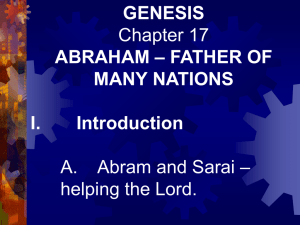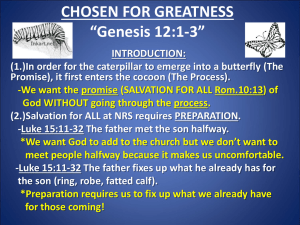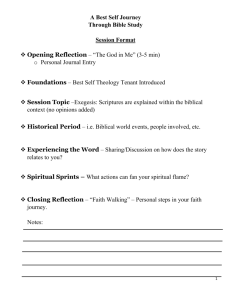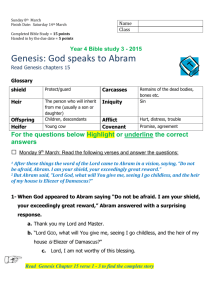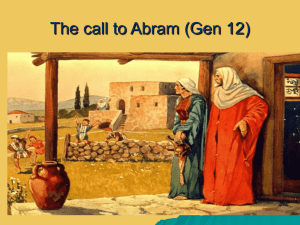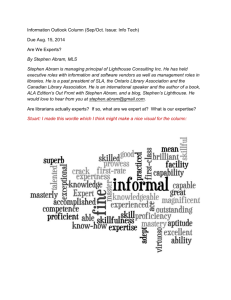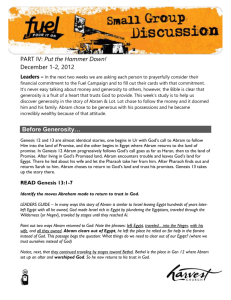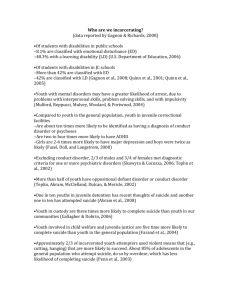covenant with Abram. In this the Lord says to Abram that he can be
advertisement
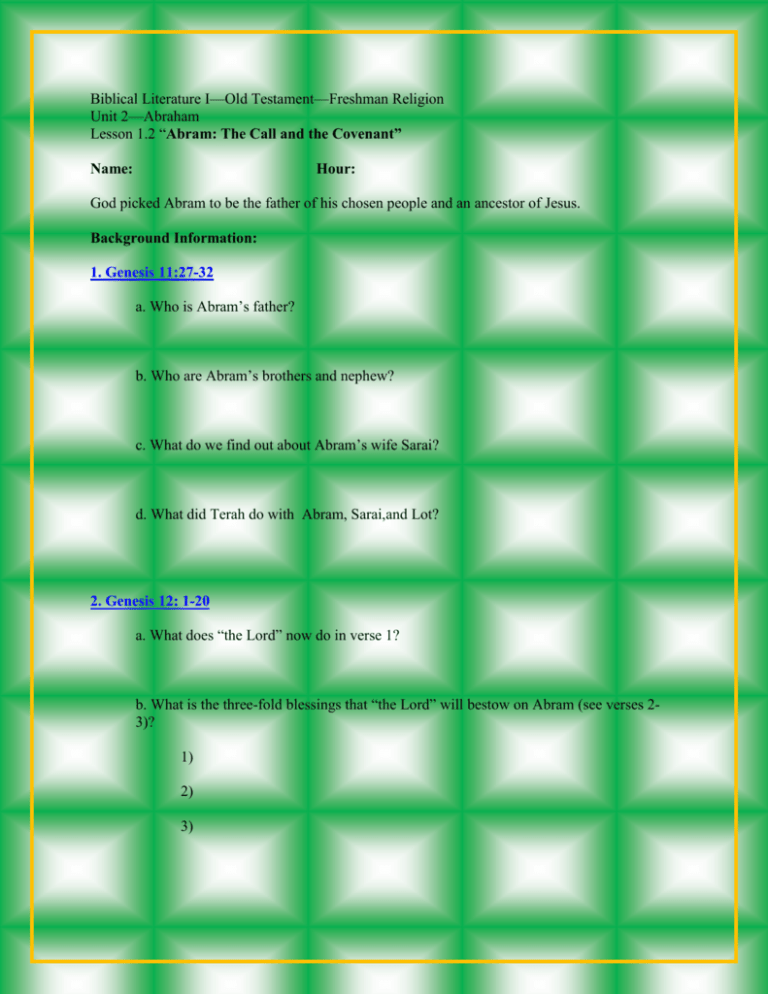
Biblical Literature I—Old Testament—Freshman Religion Unit 2—Abraham Lesson 1.2 “Abram: The Call and the Covenant” Name: Hour: God picked Abram to be the father of his chosen people and an ancestor of Jesus. Background Information: 1. Genesis 11:27-32 a. Who is Abram’s father? b. Who are Abram’s brothers and nephew? c. What do we find out about Abram’s wife Sarai? d. What did Terah do with Abram, Sarai,and Lot? 2. Genesis 12: 1-20 a. What does “the Lord” now do in verse 1? b. What is the three-fold blessings that “the Lord” will bestow on Abram (see verses 23)? 1) 2) 3) c. Why did Abram build an altar at Shechem? d. There is a famine in the land of Canaan and so Abram takes everybody to Egypt. What foolish thing does Abram convince Sarai to do? How difficult it must have been for Abram to leave his homeland of Ur and live as a stranger and foreigner in Canaan! Yet Abram obeyed, fully trusting the God of promise to be with him and bless him. At this point in Abram’s life, he has lived for many years in Canaan, yet he is sad and afraid because he and Sarai, who are quite old, still have no child. Let’s see how God comforts him with his gracious promise. 3. Genesis 15:1-5 a. How did God first comfort the fearful Abram? b. Since he and Sarai were beyond childbearing years, what did Abram think might be the way he would have an heir? c. What did God tell Abram he would do? d. In fact how many descendants would Abram have? 5. Genesis 15:6; Romans 4:18-25 a. What did Abram believe and what was the result? b. Why might it have been difficult for Abram to believe God’s promise? c. Why does Paul say that these words were written also for us? d. What are we told about “Jesus our Lord”? 6. Genesis 15:7-21 a. First, read the above selection from Genesis 15:7-21 b. Secondly, read the following article and then answer the questions that follow… “God Assures the Future For Those Who Believe” Genesis 15:7-21 Preached by Lou Going Whitefield Advent Christian Church - May 7, 2000 This is the meaning of this strange and mysterious event that now occurs in this prolonged vision that Abram had of the Lord. The Lord’s encounter with Abram lasted a full day. It begins in the evening and continues until the next evening. What is the answer that the Lord gives to Abram’s question? He answers him by cutting a covenant with Abram. In this the Lord says to Abram that he can be sure (know) that this promise will be realized. Let’s look at what happened. The Lord tells Abram to bring him certain animals. During the time of Moses we learn that each of these animals are acceptable for sacrifice. They are suitable for sacrifice to the Lord. Abram kills the animals and cuts them in half, arranging the halves opposite of each other. The dove and the young pigeon are not cut in half. The text hints at the fact that once these animals had been killed, cut in half and arranged on the ground, Abram spent a fair amount of time keeping birds of prey away from the carcasses. It is not until the sun begins to set that the Lord once again speaks to Abram. Before the Word of the Lord comes to Abram he experiences a trance like state of sleep. Yet it is not a peaceful slumber. It is accompanied by a thick and dreadful darkness, which came over Abram. Abram has a foreboding sense of dread. The thick darkness indicated that the Lord’s austere and holy presence was drawing near to Abram. “Then spake Solomon, Jehovah hath said that he would dwell in the thick darkness” Kings 8:12. (See Exodus 20:21; Deuteronomy 4:11; 5:22; Psalm 18:11). Then the Lord speaks to Abram. He tells him that before his descendants will inherit the land of promise, they too will be strangers in a strange land but unlike Abram they will be in bondage. There they will be mistreated for fo ur hundred years. But the Lord also tells Abram that after the 400 years He will punish their captors and Abram’s descendants will come out of captivity with great possessions as the Lord leads them to possess the land of Canaan. He further promises Abram that he would live a long time and die in peace. Why will Abram’s descendants have to wait for that long for deliverance and possession of the Land? The sin of the people of that land would then reach full measure. The earth is the Lord’s. It all belongs to him. He will give the land of Canaan to His people by pouring out his judgment on the present inhabitants who refuse to worship and honor Him. Then Abram sees a smoking oven or fire pot with a blazing torch pass through the pieces of the slain animals. What the text then says is that on that day the Lord made (cut) a covenant with Abram, further defining the boundaries of the land He would give to Abram’s descendants. Now two further points must be made. First, the two dimensional fulfillment of this promise was indeed realized. The river of Egypt is not the Nile but the present day Wadi el-Arish, which marks the boundary between Palestine and Egypt. It was during the reigns of David and Solomon that these boundaries were reached. It is the three-dimensional part of the Promise that is yet to be fulfilled. Again its ultimate fulfillment is in the promised homeland of an earth made new. But it is this 3-D part of the promise that is nevertheless guaranteed to those who share in the saving and justifying faith of Abram. Second, we need to grasp the astounding significance and meaning of what Abram observed. The smoking fire pot with the blazing torch was a symbol of the Lord. It was the Lord Himself who passed through the pieces of the slain animals. It is what is called a theophany. Often in the Bible God’s invisible presence is revealed in the form of lightening and fire. This was the case when Moses met Lord at Mount Sinai. He first encountered the Lord there in the bush that was on fire but not consumed. When Isaiah received his call to be a prophet the temple of the Lord was filled with fire and smoke. So the Lord was passing through these pieces. What did this mean? Often when covenants where made between two or more parties, similar particulars were involved. Animals were slain and those making the covenant would walk through the slain animal parts that had been arranged on the ground. In doing this they were basically pronouncing a curse upon themselves if they did not keep to the terms of the covenant they were promising to the other party. It was called an oath of self- malediction or judgment. In this case only the Lord past through the pieces. He was saying to Abram, “If I do not keep my promise to you may what happened to the animals happen to me.” The Lord was pledging Himself to Abram and in so doing bolstering Abram’s faith in the veracity of the Word of promise. c. How long did Abram’s encounter with the Lord last? d. What do we know about the animals that Abram was to bring before the Lord? e. How does Abram arrange the killed animals? f. What did Abram have to do with the killed animals while he waits on the Lord to act? g. What did the “thick darkness indicate..”? h. Make a list of the things that the Lord tells Abram about his descendants… 1) 2) 3) 4) i. For how many years will Abram’s descendants be in bondage? j. Why will Abram’s descendants have to wait so long to be freed? k. What does Abram see passing between the killed animals? l. What is a “theophany”? m. What is the “oath of self-maledication or judgment”? And what is the significance that the Lord took such an oath? n. Now look at the Bible text and answer… 1) For which of God’s promises did Abram seek reassurance? 2) Although God specified the lands that Abram’s descendants would inherit, he indicated that it would be four hundred years before they occupied it. To what do verses 13 and 14 refer? Old Testament Core Book 1 • Lesson 1.2 • Copy Master 2
